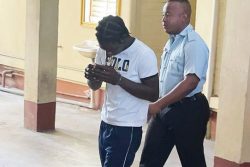Part One
This article is the first of a two part series that will deal with the use of the British Emergency Detention Bill and its impact on the development of the Preventive Detention Act, 1966 in Guyana. The second part will focus on individuals who were affected by this act and the effects it had on the opposition forces in Guyana. The characterization of the Preventive Detention Act used by Ghana, India and Guyana in the 20th century is not difficult to ascertain, because each country’s version of the act established one fact that is, social control. More so, on paper it was considered as a unique structure for detention, not for criminals but for opposition forces against the government of the day. Each Act had its foundation from the British Emergency Bill which was used by the Crown to detain persons deemed ‘terrorists’, but it was not used for criminals it was a special form of imprisonment. Each country changed the features of this bill to suit their political climate and as a result made it inhumane. Additionally, it ensured certain consequences on the opposition forces of the respective countries.
 The violence of the Gold Coast spilled over into Nkrumah’s Ghana, thus the government introduced a range of emergency measures to restore stability and protect the emergent independent nation from disintegrating. It was opined that due to the increased violence the Nkrumah government decided to introduce the preventive detention bill August 1958, which was first proposed by Krobo Edusei the then Minister of the Interior, to stop the planned assassination of the Prime Minister by opposition members of parliament. India had provided the template for Ghana’s version. The Act lapsed after five years, however arbitrary terrorist bomb attacks on citizens throughout the early 1960s made its repeal impossible.
The violence of the Gold Coast spilled over into Nkrumah’s Ghana, thus the government introduced a range of emergency measures to restore stability and protect the emergent independent nation from disintegrating. It was opined that due to the increased violence the Nkrumah government decided to introduce the preventive detention bill August 1958, which was first proposed by Krobo Edusei the then Minister of the Interior, to stop the planned assassination of the Prime Minister by opposition members of parliament. India had provided the template for Ghana’s version. The Act lapsed after five years, however arbitrary terrorist bomb attacks on citizens throughout the early 1960s made its repeal impossible.
In 1961 a new constitution went into effect in British Guiana. The legislature was bicameral: the lower house, a thirty-five-member Legislative Assembly, consisted entirely of elected officials; and the upper house, the thirteen-member Senate, consisted entirely of appointees. The prime minister, who was chosen by the party with a majority of votes in the Legislative Assembly, held the most powerful executive post. Assisting the prime minister were various other ministers. The governor remained the titular head of state. The PPP won the elections of August 1961, and Jagan was named prime minister.
Labour strife and civil disturbances were widespread in 1962 and 1963. In an effort to quell the unrest, the British colonial secretary declared a state of emergency and proposed modifying the constitution to provide for a unicameral fifty-three-member National Assembly and proportional representation. The proposal was adopted, and elections were set for 1964. These elections brought to power a new coalition government headed by the PNC. However, the PPP administration refused to step down. A constitutional amendment was enacted empowering the Governor to dismiss the National Assembly and ensuring the old government’s removal from power. In this confusion the British government instituted the Emergency Detention Bill, which saw fifteen members of the P.P.P. arrested and detained.
Importantly, Mr. Forbes Burnham in 1964 stated that the Government planned to introduce a Preventive Detention Bill similar to the Acts which were enforced in Ghana. He did not say whether it would have been done before or after independence. This saw to a flourish of disapprovals by the British parliament and members of the opposition P.P.P. They all agreed that the emergency regulations, and the pretence of the tribunal which is supposed to protect the rights of detainees, were repulsive and that they were not in favour of these emergency regulations given the force of law by the Act proposed to be passed by Mr. Forbes Burnham. Mr. Jagan stated that democracy “cannot flourish with coercion”. The British did not want to incorporate these totalitarian provisions in the constitution of a Commonwealth country which was about to receive independence, when they had censured the introduction of such provisions in the constitutions of countries such as Ghana after they had already become independent, also they were trying to prevent the illegal regime in Rhodesia from doing the very things that the Preventive Act had stipulated. Even though the British Government was against the passing of this Act, their position did not dissuade Mr. Forbes Burnham In 1966, the year Guyana gained its independence, the National Security Act was created. This Act was seen as a studied strategy considered by many to be a subterfuge to limit the political opposition. In effect this belief was made real when many political dissidents were detained by the use of the National Security Act, particularly the Preventive Detention Act. At the time this Act emerged the fifteen men were still in detention, living in deplorable conditions—badly fed, unable to meet their wives and loved ones in any kind of civilised circumstances, incapable to make a proper appeal to an authority that had the right to make judicial decisions, and with no guarantee whatsoever that they were going to be tried or charged. The Daily Chronicle, a newspaper which was owned by leading members of the United Force, the second opposition party, published Dr. Reid’s statement (14th December, 1966). “The Minister said at that meeting that these people would continue to be detained unless they changed their views, and Detention is in this case really an ideological therapy”.
The Act was very repressive, and it gave the government authority to suspend the right of habeas corpus and to restrict and detain any Guyanese without trial for an indefinite period. It also gave the police sweeping powers to search, seize, and arrest at its will. Persons especially members of the Peoples Progressive Party and the Working People’s Alliance were detained during the period of power of the then government of the day. Shortly after the July 1973 elections, further measures were added. These provided for preventive detention and restriction of movement of persons, control of firearms and ammunition, powers of search without warrants, and increased police powers. Additionally, the act stated that the government had the authority to make policies, in situations considered as “periods of war, threatened subversion and other emergency”. Amid these provisions was, “censorship and the control and suppression of publications, writings, maps, plans, photographs, communications and means of communication”. The consequences bequeathed upon the perpetrators were extremely cruel. One section of the Act stated that “any person who, without lawful authority, the burden of proof of which shall lie upon him, purchases, acquires or has in his possession any firearm, ammunition or explosive shall be guilty of an offence and shall be liable on summary conviction to a fine not exceeding one thousand dollars or to imprisonment for a term not exceeding three years or to both such fine and imprisonment and, on conviction on indictment, to imprisonment for life.” Another section stated that “any person who is proved to have had in his possession or under his control anything whatsoever in or on which is found any firearm, ammunition or explosive shall, until the contrary is proved, be deemed to have been in possession of such firearm, ammunition or explosive.” This meant that the accused was therefore presumed guilty until he/she could prove himself/herself innocent. There was also the condition of guilt by alliance. It stated that “Any person who consorts with or is found in the company of another who, without lawful authority, has in his possession any firearm, ammunition or explosive in circumstances which raise a reasonable presumption that he intends or is about to act or has recently acted with such other person in a manner prejudicial to public order or public safety, shall be guilty of an offence and shall be liable ….” Under these conditions, freedom of assembly was simply in name only. During this period there were constant outcries by the opposition of police harassment, and the violent break-up of opposition public meetings by the law enforcement institutions ended in bloodshed.
The British were appalled by the metamorphosis of their Emergency Detention Act written into the laws of Guyana in 1966. It was stated in the British parliament that the argument used to support this emasculation of democracy was “British Guiana Government would have preferred to have brought the detainees to trial under the ordinary criminal law. Unfortunately, witnesses will not come forward to give evidence in court for fear of reprisals—indeed, for fear of being murdered. If these dangerous men are to be prevented from continuing to threaten public safety and order they must be detained, abhorrent though this is to all of us. The British Guiana Government keeps each case constantly under review, and releases are made”.
The history of the detentions in British Guiana was not simple. The fifteen men were detained under the British emergency regulations. The difficulty which the British government encountered in 1964 was to persuade the coalition government in British Guiana that the emergency which may once have justified their assuming unusual powers was terminated. This preventive detention of political opponents almost derailed the date for independence in Guyana. Many members of the British parliament wanted to oppose independence for Guiana or even to postpone it. They did not want political prisoners on the day of independence. Nevertheless, if the British Government had considered the matter serious enough, they could have done what they did previously, by means of an Order in Council, to see that these fifteen men were released. More so, if the previous government had chosen to use their influence through the normal channels with the present Administration, there was little doubt that the political prisoners would have been released. Further, when the Ghana Preventive Act was in full accordance, British Parliamentarians were sent to President Nkrumah asking him to exercise clemency in dealing with certain political prisoners. His record did not ensure a happy state of affairs there, and it was unlikely that with the continued detention of the fifteen detainees the state of affairs would have been pleasant. This was never done in the Guyana scenario. It was stated that there was “something contradictory about an act which grants political freedom to Guiana but which perpetuates the denial of political freedom to some of its citizens.” However, the basis of the detention of the fifteen men was denied as being political by the coalition government, but all of the detainees were members of the P.P.P. and all were strong opponents of the then Administration. There were no members of the P.N.C. detained during this period.
In 1964, a British Parliamentarian Robert Edwards also opined that the British Guiana Government, in the interests of law and order, still had to make use of emergency powers of detention, because of the incidents which had forced them to be adopted. Soon after the coalition government was set up after the December 1964 elections, Burnham continued this claim, when he stated that it was the PPP that instigated the violence during the eighty-days strike in 1963 over the Labour Relations Bill and during the six-month strike, called by the PPP-backed Guyana Agricultural and General Workers Union (GAWU) in 1964 to demand recognition as the representative of sugar workers. However, the PPP retorted that it was the CIA, PNC, U.F. and the TUC who propagated this strife during 1962-1964 in order to destabilise and overthrow the PPP government. As a result, to repress the opposition, especially the PPP which formed the opposition after December 1964, their members were detained without any charges by the British authorities in 1964, continued to remain in prison, and more of them were detained on the grounds that they were planning terrorism against the new government.
Further, the Secretary of State for the British Colonies Frederick Lee stated that in December 1964, that the General Assembly of the United Nations had adopted a resolution which requested “the administering power to end the state of emergency and to release all political prisoners and detainees so as to enable them to participate in the political life of the territory”. Even on that occasion when the discussions took place, the British representative to the United Nations had made it apparent at the General Assembly that the request referred to matters which were the responsibility of the British Guiana Ministers. The British Government could have assumed this power only by constitutional change, and this constitutional change of itself would true to form see to the postponement of independence which would have been contrary to the same United Nations resolution which requested the same administering power not to take any action which might delay the independence of the territory.









